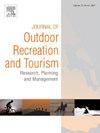Human–nature relations in the Anthropocene: Responsible hiking and ecological balance in Thiềng Liềng
IF 4.4
3区 管理学
Q1 HOSPITALITY, LEISURE, SPORT & TOURISM
Journal of Outdoor Recreation and Tourism-Research Planning and Management
Pub Date : 2025-07-28
DOI:10.1016/j.jort.2025.100926
引用次数: 0
Abstract
Purpose
This study investigates how responsible hiking tourism practices in Thiềng Liềng foster balanced human–nature relationships and ecological sustainability, addressing Anthropocene challenges such as climate change and ecological degradation. It explores how locally-led adaptive governance can effectively mediate tourist impacts and contribute to community and ecological resilience.
Study design/methodology/approach
A qualitative case study design was adopted, utilising semi-structured interviews conducted between 2022 and 2025. The analysis was guided by three complementary frameworks—Social-Ecological Systems (SES) theory, Critical Place Inquiry (CPI), and the Experiencing Place lens—which together enabled a nuanced examination of the relational dynamics among tourists, community members, local governance actors, and the surrounding environment.
Findings
The study identifies robust responsible tourism practices—educational guided hikes, ecologically strategic trail infrastructure, and community-driven visitor guidelines—that significantly reduced ecological disruptions and enhanced visitor environmental awareness. This study finds that responsible hiking in Thiềng Liềng has become a vital component of community-based tourism, fostering ecological preservation and transformative experiences through practices like forest bathing and storytelling that promote deep ecological awareness and non-dualistic human–nature relationships. Emphasizing the integration of deep ecology and bottom-up, indigenous knowledge, the study advocates for nature-based tourism approaches rooted in ethical engagement, cultural authenticity, and experiential place-making.
Originality/value
This research contributes to sustainable tourism by empirically demonstrating how responsible hiking, community-based governance, and ecological resilience can be effectively integrated within the Anthropocene context. Theoretical contributions are made through the application of Social-Ecological Systems (SES) theory, Critical Place Inquiry (CPI), and the Experiencing Place lens, all of which underscore the value of locally adaptive, culturally grounded tourism strategies that balance ecological and community well-being.
人类世的人与自然关系:负责任的徒步旅行和生态平衡Thiềng Liềng
目的本研究探讨Thiềng Liềng负责任的徒步旅行实践如何促进平衡的人与自然关系和生态可持续性,应对气候变化和生态退化等人类世挑战。它探讨了地方主导的适应性治理如何有效地调节旅游影响,并有助于社区和生态弹性。研究设计/方法/方法采用定性案例研究设计,利用2022年至2025年间进行的半结构化访谈。该分析由三个互补的框架——社会生态系统(SES)理论、关键场所调查(CPI)和体验场所视角——指导,它们共同对游客、社区成员、地方治理参与者和周围环境之间的关系动态进行了细致入微的考察。研究结果:研究确定了强有力的负责任的旅游实践——有教育指导的徒步旅行、生态战略步道基础设施和社区驱动的游客指南——这些实践显著减少了生态破坏,提高了游客的环保意识。该研究发现,Thiềng Liềng的负责任徒步旅行已成为社区旅游的重要组成部分,通过森林浴和讲故事等实践促进生态保护和变革体验,促进深刻的生态意识和非二元的人与自然关系。该研究强调深层生态学和自下而上的本土知识的整合,倡导基于伦理参与、文化真实性和体验性场所制作的自然旅游方法。原创性/价值本研究通过实证证明如何在人类世背景下有效地整合负责任的徒步旅行、社区治理和生态恢复力,从而为可持续旅游做出贡献。本文通过应用社会生态系统(SES)理论、关键地点调查(CPI)和体验地点视角做出了理论贡献,所有这些都强调了平衡生态和社区福祉的地方适应性、文化基础旅游战略的价值。
本文章由计算机程序翻译,如有差异,请以英文原文为准。
求助全文
约1分钟内获得全文
求助全文
来源期刊

Journal of Outdoor Recreation and Tourism-Research Planning and Management
HOSPITALITY, LEISURE, SPORT & TOURISM-
CiteScore
6.70
自引率
5.30%
发文量
84
期刊介绍:
Journal of Outdoor Recreation and Tourism offers a dedicated outlet for research relevant to social sciences and natural resources. The journal publishes peer reviewed original research on all aspects of outdoor recreation planning and management, covering the entire spectrum of settings from wilderness to urban outdoor recreation opportunities. It also focuses on new products and findings in nature based tourism and park management. JORT is an interdisciplinary and transdisciplinary journal, articles may focus on any aspect of theory, method, or concept of outdoor recreation research, planning or management, and interdisciplinary work is especially welcome, and may be of a theoretical and/or a case study nature. Depending on the topic of investigation, articles may be positioned within one academic discipline, or draw from several disciplines in an integrative manner, with overarching relevance to social sciences and natural resources. JORT is international in scope and attracts scholars from all reaches of the world to facilitate the exchange of ideas. As such, the journal enhances understanding of scientific knowledge, empirical results, and practitioners'' needs. Therefore in JORT each article is accompanied by an executive summary, written by the editors or authors, highlighting the planning and management relevant aspects of the article.
 求助内容:
求助内容: 应助结果提醒方式:
应助结果提醒方式:


